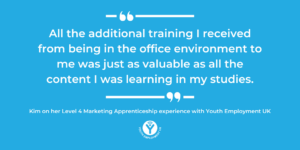Sales Executive careers guide and job profile
Want a job where you’ll work with people? Why not consider a career as a Sales Executive?
Getting into Sales Executive careers
How much money can you earn as a Sales Executive?
These LMI Job Trends give you a sneak peek of how much you could earn starting out for this career, and how much your salary could grow with experience.
Average salary for Sales jobs
Recent labour market information says you can earn on average between £16,000 and £50,000 a year as a Sales Executive in the UK.
Your starting salary can vary because of factors like level of experience, training, location or the size of the company. Your salary as a Sales Executive will increase over time as you build skills, knowledge, and experience.
Sales, Marketing & Procurement Career FAQs & Insights

Is there something you’d like to know about Sales, Marketing & Procurement careers?
Skills you need to become a Sales Executive
Useful skills to put in your CV:
- Fantastic customer service and communication skills
- Negotiation skills and being able to sell goods and services
- IT and presentation skills (you may be asked to create easy-to-read reports, or slideshows, or you may need to juggle sales information and communications from one device to another, e.g. from laptop to phone)
Top Skills-boosting Tip
Get into Lifelong Learning.
Continuing to build and perfect your skills throughout your career, and learn new ones too.
Find out how in the Lifelong Learning hub by clicking the button below.
- Self-belief skills – you will have self-confidence and enthusiasm
- Good personal presentation as you are the ambassador for a product or service
- Self-management skills so that you can plan your work day and never miss a meeting
How Do You Get These Skills?
Vocational qualifications and work experience will help you build these skills over time.

Build Your Skills With the FREE Young Professional Programme
What Qualifications & Training Do You Need For Sales Careers?
BTECs
As an alternative to A-Levels, you can do BTECs from the age of 16. There are a number of BTEC subjects you might want to consider if you are interested in becoming a Sales Executive. Courses available could include:
- BTEC in Principles of Sales Level 3
- BTEC Sales and Marketing
- BTEC Certificate in Sales
- BTEC Level 3 Extended Diploma in Business
Courses available can vary across schools, colleges and sixth forms and across training providers.
You’ll normally need 2 or more GCSEs at grades 9-3 (A*-D) or equivalent for a Level 2 or 3 course. If your qualifications are lower than this, you’ll most likely start on a Level 1 course.
University degrees and graduates
You may need to do a degree in a subject related to your area of sales, especially if you’re selling specialist products or services, for example pharmaceuticals.
UCAS has more information on degree courses and entry requirements.
A-Levels
A Levels are academic qualifications that come after GCSEs. A Levels can be an ideal stepping stone to an advanced apprenticeship, a degree, a job, or going straight into a freelance career.
Any A Levels relating to Maths or Business may be useful.
You’ll normally need GCSEs at grade 4 (C) or above in English and Maths. 2 to 3 relevant A levels, or equivalent, are usually required to complete a degree.
Apprenticeships
An apprenticeship is a scheme where you train while earning a starting salary. With an apprenticeship (or advanced apprenticeship) you’ll have a paid job with an employer that includes structured training and learning. This training leads to an official qualification that’s recognised by employers as an industry standard.
The apprenticeship route you take will depend on the kind of products or services you want to sell. You could do a:
- Level 3 IT technical salesperson higher apprenticeship
- Level 4 Sales executive higher apprenticeship
- Level 6 Business to business sales professional degree apprenticeship
Apprenticeships in retail, customer service or marketing may also give you useful experience for getting into this role.
Anyone over 16 can study for an apprenticeship. You will normally need at least 5 GCSEs at grades 4-9 (A*-C) to study for an apprenticeship, including English and Maths.
T-Levels
T-Levels are a choice for learners after GCSEs alongside apprenticeships and A-levels.
T Levels, an alternative to A-Levels, are qualifications in vocational, technical and hands-on subjects that you can choose to do after GCSEs instead of traditional academic qualifications.
They include a mixture of classroom-based learning and industry placements where you can put your new skills into practice in real-world scenarios.
You may need 4 or 5 GCSEs at grades 9 to 4 (A* to C), or equivalent, including English and maths for T Levels.
Career Progression
Where your career could take you…
What Work Experience Do You Need For Sales Jobs?
Work Experience Tips
It can help you decide if this is the right career for you if you have previously done work experience in sales. Work experience in a sales environment can help you build useful skills.
Examples of relevant work experience include:
- Work shadowing (even if it’s just for a day)
- Work placements in a company
- Work experience placements on a college or university course
Work experience in an office environment, or in sales and communication environment (e.g. a call centre or telephone sales environment can help. It can also help if you can demonstrate experience of keeping calm under pressure in a busy environment or with deadlines looming, or if you can soothe dissatisfied clients or customers with diplomacy and understanding.
Volunteering Tips
A lot of volunteering relates to communication with people and displaying initiative – two skills that are highly rated in the sales sector.
For example, organising a school charity event or setting up a fundraising campaign for your charity efforts shows initiative and persuasion skills.
Taking part in a fun run or volunteering abroad shows you have drive and endurance, and the ambition to see a project through even if it’s out of your comfort zone.
Volunteering with vulnerable people like the homeless or elderly shows you are able to communicate with and relate to a wide range of people, using skills like diplomacy and tact.
What Does A Sales Executive Do?
Some example daily responsibilities include:
- Getting in touch with new and existing customers. Your job is to persuade new customers to love what your company offers, and make sure existing customers are really happy with the service they’re getting and want to continue the business relationship.
- Making presentations to promote new products and services
- Negotiating sales, prices and delivery
- Keeping up the contact with customers before and after sales
- Making a record of any orders or sales made
- Heading to meetings with clients and customers, or going to conference to keep up with the latest industry trends
- Meeting sales targets
How To Find Sales Executive Jobs: Next Steps
To find jobs for young people in this role, search on jobs boards for early career roles and opportunities with keywords such as:
- Sales apprentice
- Business development apprentice
- Apprentice sales consultant
- Trainee sales executive
- Graduate sales executive
You can take a look at our database of local opportunities to see if there are any relevant jobs, work placements, or careers events and workshops to help you get started. Create Your Future!
Get Into Sales Careers With Youth-Friendly Employers
These employers and organisations are here to help. They care about your potential and desire to learn, not just your qualifications and experience. They may be able to offer traineeships, apprenticeships, graduate schemes, first jobs, careers advice, wellbeing support and much more.
Sales, Marketing & Buying Career Tips & Opportunities
Sales, Procurement & Marketing Career Guides
View job descriptions with average UK salary, useful qualifications and a variety of routes into this career.
See All Our Youth-Friendly Employers

























YES! I Want More Free Careers Help...
So what are you waiting for? Grab your future.



































